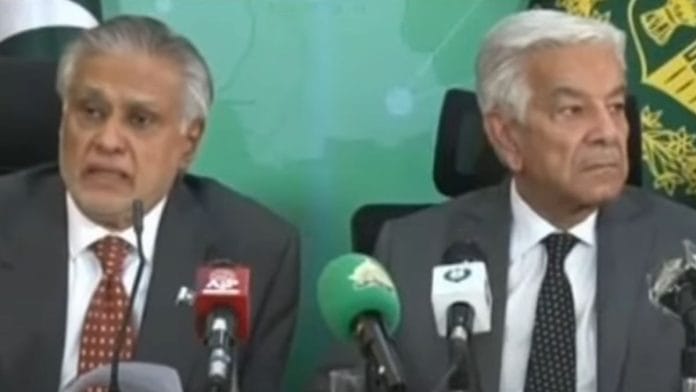New Delhi: As tensions between India and Pakistan surge in the aftermath of the Pahalgam terror attack, ministers in Pakistan’s federal government said Thursday that if India were to launch any military action or place the blame of the attack on Pakistan, the response would be “immediate and proportionate”.
Speaking at a press conference in Islamabad post the National Security Committee meeting, Pakistan’s Defence Minister Khawaja Asif declared, “India should not doubt our readiness. If the blame becomes official, the response will be swift. We will not bow to international pressure when it comes to our sovereignty.”
Foreign Minister Ishaq Dar added, “If anyone dares to launch an adventure, let history be a reminder—they’ve tried before and failed. This time, the consequences will be even more severe.”
These statements came just hours after Indian Prime Minister Narendra Modi, addressing a rally in Bihar’s Madhubani district, issued his first public reaction to the Pahalgam attack. Breaking from his habit of speaking in Hindi, even on international platforms, Modi switched to English to deliver a direct message to the global community.
“India will identify, track, and punish every terrorist and their backers. We will pursue them to the ends of the Earth,” Modi said emphatically, adding, “India’s spirit will never be broken by terrorism. Terrorism will not go unpunished.”
The Prime Minister’s words reflected the mood at the Cabinet Committee on Security (CCS) meeting held Wednesday, after which the government vowed to ensure justice for the attack, declaring that both the perpetrators and their “sponsors” will be held accountable.
Responding to India’s decision to put the Indus Waters Treaty in abeyance, Pakistan’s Attorney General Mansoor Awan emphasised that the agreement is binding and cannot be terminated unilaterally.
“Any termination of the treaty must be by mutual agreement,” he said.
Pakistan’s Deputy PM and Foreign Minister Dar added that the demarche handed to the Pakistani High Commission in New Delhi, which outlined India’s decisions, notably made no mention of the treaty.
Islamabad also rejected any allegations linking it to the Pahalgam attack. Instead, Dar said, “We’ve acted with patience and good faith in fulfilling our diplomatic obligations. But India has chosen to politicise a tragedy and malign Pakistan without a shred of credible evidence.”
In a bid to flip the narrative, Pakistan’s ministers accused India of using terrorism as a foreign policy tool. “These are not speculations. These are hard facts,” said Asif, alleging that Indian medical institutions treated members of banned groups like the Tehreek-e-Taliban Pakistan (TTP) and the Balochistan Liberation Army (BLA).
“India is actively sponsoring terrorism in our country, waging a low intensity war using BLA. TTP and BLA are proxies for us. If they increase the stakes, we are ready for it. We will not come under any international pressure,” Dar said at the press conference.
He also claimed Pakistan noted the ‘arrival in Srinagar of some foreign nationals’ under surveillance by intelligence agencies. “We know Indian intelligence is supporting them and the foreigners are trying to export IEDs. You can imagine where they are trying to export them,” Dar said, adding that Pakistan’s armed forces were “prepared” to deal with any challenge.
In a rare personal attack on the Indian leadership, Dar said, “Modi is the only world leader who had visa restrictions imposed on him for terrorism… Tell me one other country where a certified terrorist is leading the government.” He went further, saying, “India exported terrorism to Canada and the US. Canada ended diplomatic relations over it. No international country has made such allegations against Pakistan.”
Pakistan’s Federal Minister for Information and Broadcasting Attaullah Tarar warned that airspace closures could damage the Indian economy. “India is using terrorism for political gain,” he said. “We are a frontline state against terrorism. Now they’re trying to flip the narrative. But we will win this narrative war—just like we did after Pulwama.”
Dar concluded by affirming that Pakistan is not waiting for support from allies like China. “If they help, good. If not, we can fight on our own.”
(Edited by Amrtansh Arora)







India can meet any situation NOW.
i